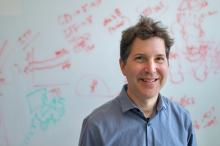Proteins mediate the critical processes of life and beautifully solve the challenges faced during the evolution of modern organisms. Our goal is to design a new generation of proteins that address current-day problems not faced during evolution. In contrast to traditional protein engineering efforts, which have focused on modifying naturally occurring proteins, we design new proteins from scratch to optimally solve the problem at hand. Increasingly, we develop and use deep learning methods to design amino acid sequences that are predicted to fold to desired structures and functions. We produce synthetic genes encoding these sequences and characterize them experimentally. In this talk, I will describe several recent advances in protein design.
David Baker is a Nobel laureate, professor of biochemistry, HHMI investigator, and director of the Institute for Protein Design at the University of Washington. His lab develops software for protein design and uses it to create molecules that address challenges in medicine, technology, and sustainability. Recent work includes the development of machine learning methods for generating functional proteins.
David is also an adjunct professor of genome sciences, bioengineering, chemical engineering, computer science, and physics at the University of Washington. He has published more than 650 scientific papers, been awarded over 100 patents, and co-founded 21 biotechnology companies. More than 100 of his trainees have gone on to independent faculty positions.
He is the recipient of numerous awards, including the 2024 Nobel Prize in Chemistry “for computational protein design.” He is an elected member of the National Academy of Sciences and was included on TIME’s list of the 100 Most Influential People in health.
David received his PhD in biochemistry with Randy Schekman at the University of California, Berkeley, and conducted postdoctoral research in biophysics with David Agard at UCSF.
